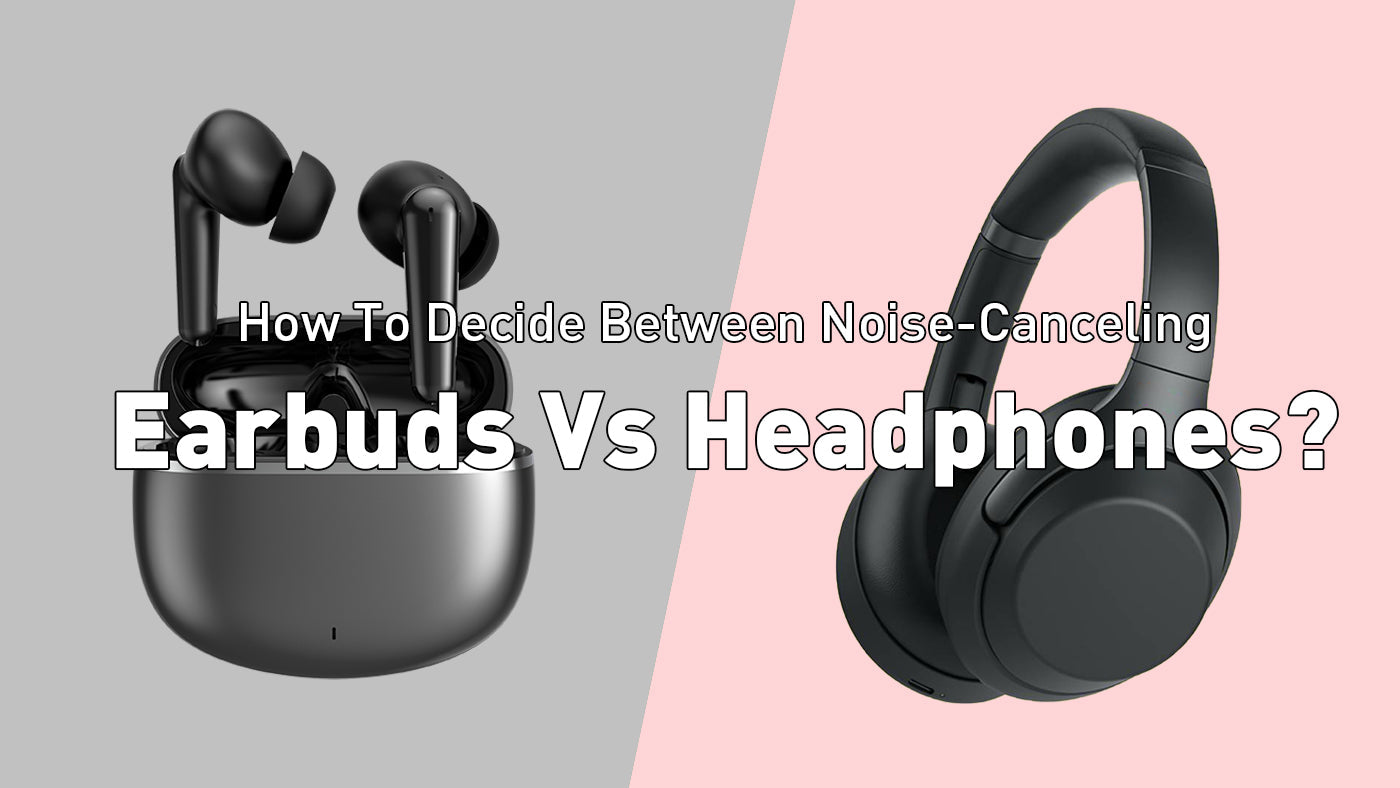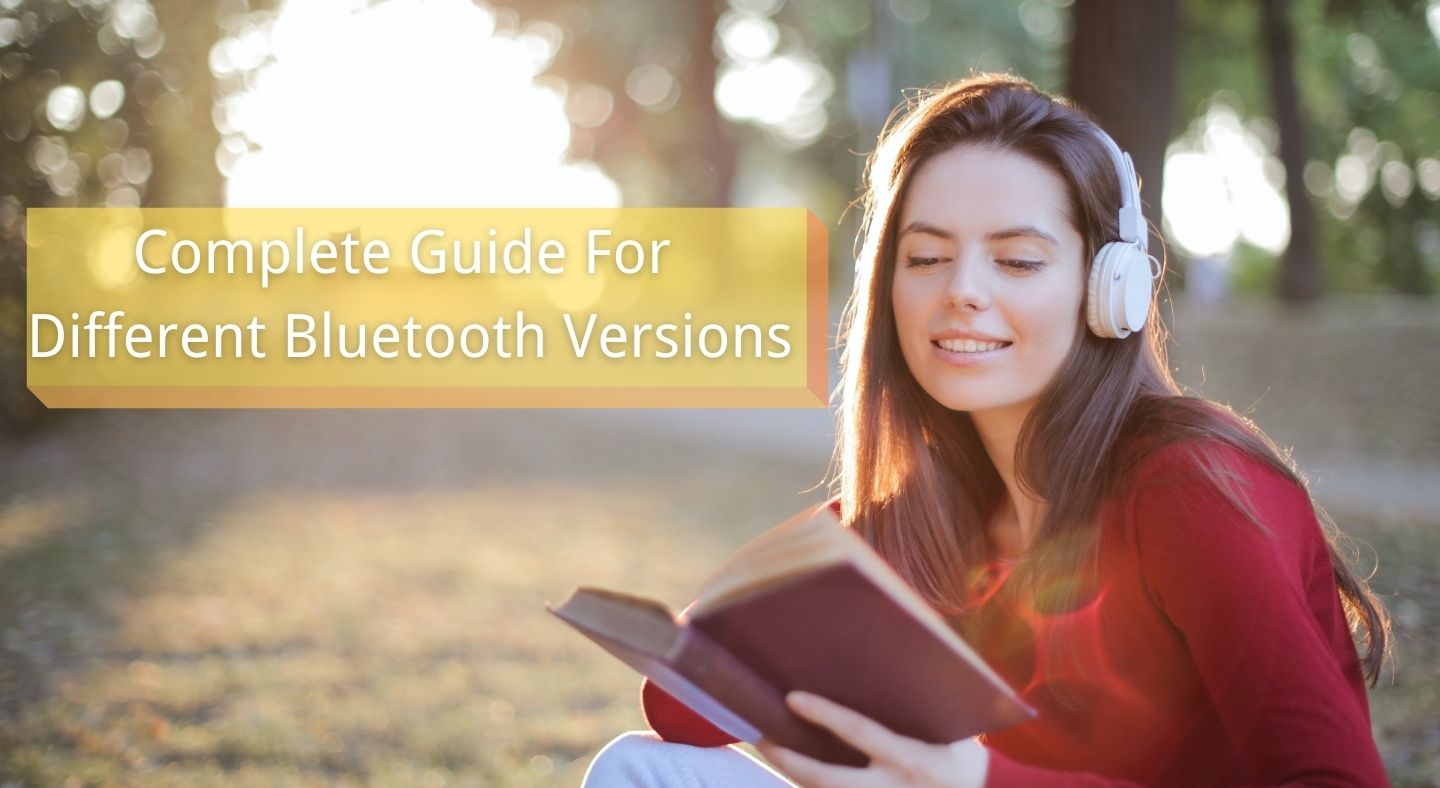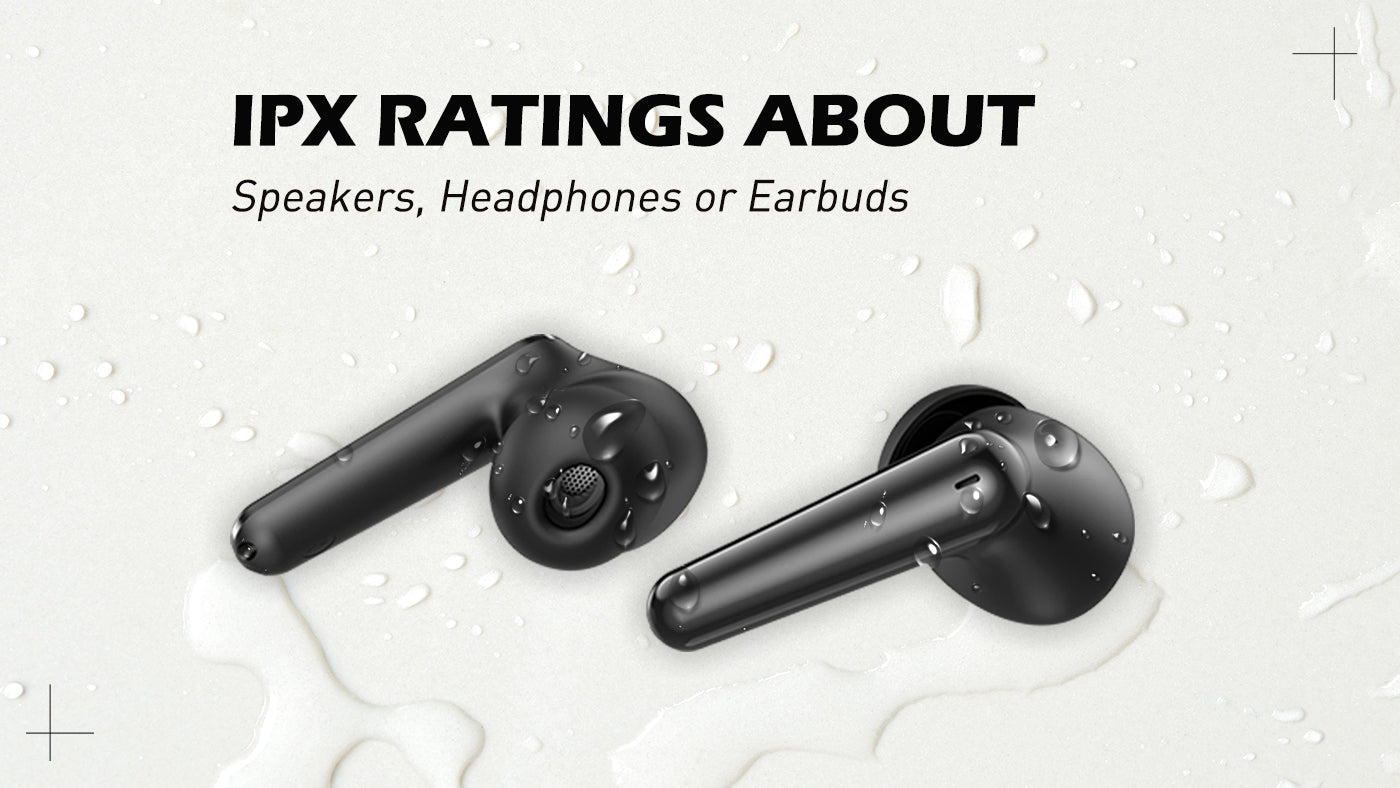There are many different types of headphones on the market these days, from noise-canceling earbuds to traditional headphones.
So which one should you choose? In this article, we will compare and contrast noise-canceling earbuds vs headphones to help you make the best decision for your needs.
What Is Noise-Canceling Earbuds?
Noise-canceling earbuds are a type of headphones that use active noise control to reduce the amount of background noise that the user hears. This is accomplished by creating a sound wave that is 180 degrees out of phase with the incoming noise, which effectively cancels out the noise.
Noise-canceling earbuds are often used by people who work in noisy environments, such as air traffic controllers and factory workers. They can also be used by people who want to enjoy their music or other audio without being distracted by background noise.
Some noise-canceling earbuds even have built-in microphones that can be used for making phone calls or recording audio.
How Do Noise-Canceling Earbuds Work?
It’s important to understand how noise-canceling earbuds work to decide if they are the right type of headphones for you. Let's take a look at how they work:
Noise-canceling earbuds use what is called active noise control (ANC) to reduce the amount of background noise that you hear. ANC works by creating a sound wave that is 180 degrees out of phase with the incoming noise. This effectively cancels out the noise, leaving you with only the sound that you want to hear.
Some noise-canceling earbuds even have built-in microphones that can be used for making phone calls or recording audio. The microphone picks up your voice and cancels out the background noise, so the person on the other end can hear you clearly.
Advantages Of Noise-Canceling Earbuds
In addition to blocking out unwanted noise, noise-canceling earbuds have several other advantages. Let's take a look at some of the benefits of noise-canceling earbuds:
1. You can enjoy your music or audio without being distracted by background noise.
2. They are perfect for people who work in noisy environments, such as air traffic controllers and factory workers.
3. Some models have built-in microphones that can be used for making phone calls or recording audio.
4. They can help you concentrate and increase your productivity.
5. They can reduce stress and help you relax.
6. They can improve your sleep quality by blocking out unwanted noise.
Disadvantages Of Noise-Canceling Earbuds
Noise-canceling earbuds also have a few disadvantages that you should be aware of before making your purchase. Check out a few drawbacks of noise-canceling earbuds:
1. They can be more expensive than traditional headphones.
2. They require batteries to operate, which means you will need to keep a spare set of batteries on hand.
3. Some people find that they produce a hissing sound when they are turned on.
4. They can make your ears feel hot and sweaty after wearing them for a long period.
5. They may not completely block out all background noise.
What Is Noise-Canceling Headphones?
Noise-canceling headphones are designed to reduce unwanted ambient sounds using active noise control. Noise-canceling headphones use microphones to pick up low-frequency sounds and then produce an inverse wave that cancels out the unwanted sound.
They are commonly used in noisy environments such as on aircraft and trains. Some people also use them to try studying or working in peace. Although noise-canceling headphones can be effective in reducing background noise, they do not completely block out all sound.
In addition, they may increase the risk of hearing damage if used at high volumes for long periods. As a result, it is important to use them responsibly and consult with a doctor if you have any concerns about your hearing.
How Do Noise-Canceling Headphones Work?
Before we get into the differences between noise-canceling earbuds and headphones, it's important to understand how noise-canceling headphones work.
Noise-canceling headphones use what is called active noise control (ANC) to reduce the amount of background noise that you hear. ANC works by creating a sound wave that is 180 degrees out of phase with the incoming noise. This effectively cancels out the noise, leaving you with only the sound that you want to hear.
Some noise-canceling headphones even have built-in microphones that can be used for making phone calls or recording audio. The microphone picks up your voice and cancels out the background noise, so the person on the other end can hear you clearly.
Advantages Of Noise-Canceling Headphones
In terms of noise reduction, noise-canceling headphones have several advantages over earbuds. Let's take a look at some of the benefits of noise-canceling headphones:
1. They can effectively block out a wider range of frequencies, making them better at reducing background noise.
2. They don't require batteries to operate, so you don't have to worry about them running out of power.
3. They are less likely to cause hearing damage because they don't need to be turned up as loud to cancel out noise.
4. They are more comfortable to wear for long periods.
5. They can be used with or without a wire, so you have more flexibility in how you use them.
Disadvantages Of Noise-Canceling Headphones
Noise-canceling headphones also have a few disadvantages that you should be aware of before making your purchase. Check out a few drawbacks of noise-canceling headphones:
1. They can be more expensive than traditional headphones.
2. They are not as effective at canceling out low-frequency sounds.
3. They can make your ears feel hot and sweaty after wearing them for a long period.
4. They may not completely block out all background noise.
5. They can be bulky and difficult to carry around.
Types Of Noise Cancellation
You may be wondering how noise-canceling headphones work to reduce noise. The answer lies in the type of noise cancellation that they use. There are three main types of noise cancellation. Let's take a look at each one:
1. Passive Noise Cancellation
This type of noise cancellation uses physical barriers to block out sound. For example, earplugs and noise-canceling headphones both use passive noise cancellation. When it comes to headphones, the ear cups of noise-canceling headphones are designed to create a seal around your ears. This helps to block out external noise.
2. Active Noise Cancellation
Active noise cancellation is more effective than passive noise cancellation, but it also requires batteries to operate. In general, noise-canceling headphones use active noise cancellation. However, some earbuds also use active noise cancellation.
3. Adaptive Noise Cancellation
Adaptive noise cancellation is the most effective type of noise cancellation, but it is also the most expensive. For this reason, it is not as common as the other two types of noise cancellation. Adaptive noise cancellation uses a microphone to pick up on external noise.
It then creates a sound wave that is 180 degrees out of phase with the noise. This effectively cancels out the noise, leaving you with only the sound that you want to hear.
So Can ANC Earbuds Cancel As Much Noise As ANC Headphones?
The answer to this question is a bit complicated. In general, noise-canceling headphones are better at canceling out noise than earbuds. This is because they can block out a wider range of frequencies and they don't need batteries to operate.
However, some earbuds use active noise cancellation and they can be just as effective at reducing noise. It depends on the specific product that you are looking at.
In general, noise-canceling headphones are the better choice if you are looking for the best noise reduction. However, earbuds can be a good choice if you are looking for a more portable option.
Stationary Use At Home Or In The Open Office
If you will be using your noise-canceling earbuds or headphones primarily in a stationary setting, such as at home or in the open office, there are a few things that you should keep in mind.
· First, you will want to make sure that the earbuds or headphones fit well and are comfortable to wear for long periods.
· You will also want to consider the sound quality of the earbuds or headphones. If you will be using them for music listening, you will want to make sure that they have good sound quality.
· Finally, you will want to consider the battery life of the earbuds or headphones. If you will be using them for long periods, you will want to make sure that they have long battery life.
You Can Use It For Travel And On The Move
When it comes to noise-canceling earbuds vs headphones, both options can be great for travel and on the move.
If you will be using your earbuds or headphones primarily for travel, you will want to make sure that they are small and portable.
Finally, you will want to make sure that they can block out a wide range of frequencies. If you will be using your earbuds or headphones primarily on the move, you will want to make sure that they are comfortable to wear and that they have a good seal.
Exercise
Exercise can be a great time to use noise-canceling earbuds or headphones. If you will be using your earbuds or headphones for exercise, you will want to make sure that they are comfortable to wear and that they have a good seal. You will also want to make sure that they are sweat-resistant.
Sleep
Sleep can be a great time to use noise-canceling earbuds or headphones. If you will be using your earbuds or headphones for sleep, you will want to make sure that they are comfortable to wear and that they have a good seal.
FAQs About Noise-Canceling Headphones Vs Earbuds!
Are Noise-Canceling Earbuds Worth The Investment?
There is no definitive answer to this question. It depends on your specific needs and budget.
Noise-canceling earbuds can be a valuable tool for people who need to focus in noisy environments or who are regularly exposed to loud noises. They can also be helpful for people who travel frequently and want to avoid the sound of engine noise or cabin chatter. However, they are not always necessary and can be expensive, so it's important to weigh the pros and cons before making a purchase.
Why Do People Use Noise-Canceling Headphones?
People use noise-canceling headphones to reduce or eliminate environmental noise.
Noise-canceling headphones work by creating a sound wave that is exactly the opposite of environmental noise. This sound wave is then played through the headphones, and it effectively cancels out the environmental noise.
This can be especially helpful for people who work in busy environments, or who have to travel on planes or trains. It can also be helpful for people who are trying to study or relax in a noisy environment.
How To Pick The Right Earbuds?
When looking for earbuds, it is important to consider the type of activity you will be using them for, as well as your personal preferences.
Some factors to consider include:
-The fit of the earbuds: Will they stay in your ears while you are active?
-The sound quality: How clear does the music sound?
-Durability: How well will the earbuds hold up if you are active?
-Additional features: Can they be used for hands-free calling? Are they water-resistant?
Once you have considered these factors, you can then begin to compare different earbud models and find the pair that best suits your needs.
Is Noise-Canceling A Danger To Your Ears?
Noise-canceling headphones are a great way to block out unwanted noise and improve your listening experience. However, there is some debate about whether or not they are safe for your ears.
Some people argue that noise-canceling headphones can be dangerous because they block out all noise, including important sounds like alarms and warning signals. Others argue that noise-canceling headphones are actually beneficial for your ears because they protect them from damage caused by loud noises.
There is no definitive answer to this question. Some experts believe that noise-canceling headphones are safe for most people, but it is always best to consult with a healthcare professional before using them if you have any concerns.
What Type Of Noise Cancellation Is Right For You?
There are a few different types of noise cancellation technology on the market, so it can be tough to decide which one is right for you. Here's a breakdown of the most common types:
- Passive Noise Cancellation: This type of noise cancellation is based on soundproofing materials that reduce or block sound from entering or leaving a room. It's the most common type of noise cancellation and is often used in headphones to reduce outside noise.
- Active Noise Cancellation: Active noise cancellation uses electronic circuitry to create inverse waves that cancel out incoming sound waves. This type of noise cancellation is often used in headphones and earbuds to reduce outside noise, but it can also be used in larger speakers and headphones to create a "silent room" effect.
- Hybrid Noise Cancellation: Hybrid noise cancellation is a combination of passive and active noise cancellation. This type of noise cancellation is often used in headphones and earbuds to reduce outside noise, but it can also be used in larger speakers and headphones to create a "silent room" effect.
Noise-Canceling Earbuds Vs Headphones: Which Is Right For You?
The type of noise cancellation you need depend on your personal preferences and the type of activity you plan on using them for. If you want to block out noise so you can concentrate or relax, then active noise cancellation might be the best option for you.
If you need to hear some ambient noise for safety reasons, then passive noise cancellation might be a better option. And if you want the best of both worlds, then hybrid noise cancellation might be the right choice.
No matter which type of noise cancellation you choose, make sure to test it out in different environments to see how well it works for you.
Conclusion
So, how do you decide which is better for you? Well, it depends on your needs. If you’re looking for headphones that will completely block out noise so you can focus on your work or if you’re a frequent flyer who wants to get some peace on your next flight, then noise-canceling earbuds are the way to go.
However, if sound quality is more important to you than blocking out background noise and you don’t mind carrying around a little extra weight; headphones may be a better choice for you.




1 comment
Bayan
I want bluetooth headphones
I want bluetooth headphones